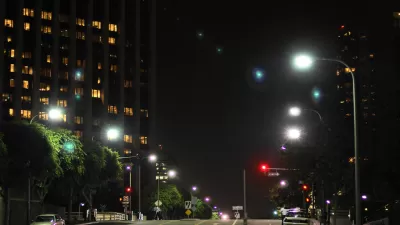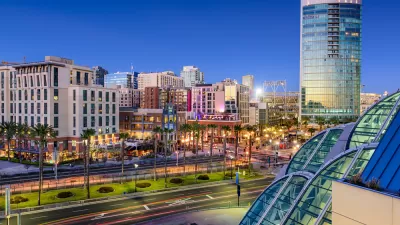A public-private partnership between the city of San Diego and GE Current to develop a smart streetlights program started in 2017 has not lived up to expectations three years and $300 million dollars later.

In 2017, the city of San Diego began to plan for a smart streetlights program that would provide democratized, anonymous data on real-time movement of vehicles, pedestrians, and cyclists to planners and developers. Initially funded by a loan from General Electric, the city teamed up with the private Boston-based company GE Current to launch the program. "The company was promising to fundamentally transform the way the public interacts with its government and its neighbors with data," imparts Jesse Marx.
More than three years since the formation of the partnership issues with unreliable data and difficulties with the installation of the smart streetlights, there is concern that the program is not living up to its original promotional promises including using the sensors to help drivers find open parking spots across the city. "The city’s Sustainability Department has been looking at the data to see how stay-at-home orders are changing pedestrian activity, but officials said they were unaware of any public-facing apps that had been developed yet," writes Marx.
Despite weekly requests for access to data, researchers and developers are unable to create the kinds of apps promised to improve quality of life for San Diego residents because of faulty, incorrect, or unavailable data. According to Marx, only about a dozen of the 3,000 streetlights are producing information.
Technologist and the director of the San Diego Regional Data Library says that San Diego is not alone in its difficulties of implementing new big data systems, citing an underestimation of the effort involved in these projects. In addition, while San Diego owns the raw data collected by sensors, GE Current owns all of the analyzed data as a result of the original contract. City officials will present details to the City Council later in 2020. Moving forward, the city aims to bring between five and ten sensors into the network on a weekly basis. With a budget deficit of about $300 million, Mayor Kevin Faulconer hopes to maintain the $1.3 million in annual funding for the project.
FULL STORY: Smart Streetlights Aren’t Delivering the Data Boosters Promised

Alabama: Trump Terminates Settlements for Black Communities Harmed By Raw Sewage
Trump deemed the landmark civil rights agreement “illegal DEI and environmental justice policy.”

Planetizen Federal Action Tracker
A weekly monitor of how Trump’s orders and actions are impacting planners and planning in America.

Why Should We Subsidize Public Transportation?
Many public transit agencies face financial stress due to rising costs, declining fare revenue, and declining subsidies. Transit advocates must provide a strong business case for increasing public transit funding.

Understanding Road Diets
An explainer from Momentum highlights the advantages of reducing vehicle lanes in favor of more bike, transit, and pedestrian infrastructure.

New California Law Regulates Warehouse Pollution
A new law tightens building and emissions regulations for large distribution warehouses to mitigate air pollution and traffic in surrounding communities.

Phoenix Announces Opening Date for Light Rail Extension
The South Central extension will connect South Phoenix to downtown and other major hubs starting on June 7.
Urban Design for Planners 1: Software Tools
This six-course series explores essential urban design concepts using open source software and equips planners with the tools they need to participate fully in the urban design process.
Planning for Universal Design
Learn the tools for implementing Universal Design in planning regulations.
Caltrans
Smith Gee Studio
Institute for Housing and Urban Development Studies (IHS)
City of Grandview
Harvard GSD Executive Education
Toledo-Lucas County Plan Commissions
Salt Lake City
NYU Wagner Graduate School of Public Service





























